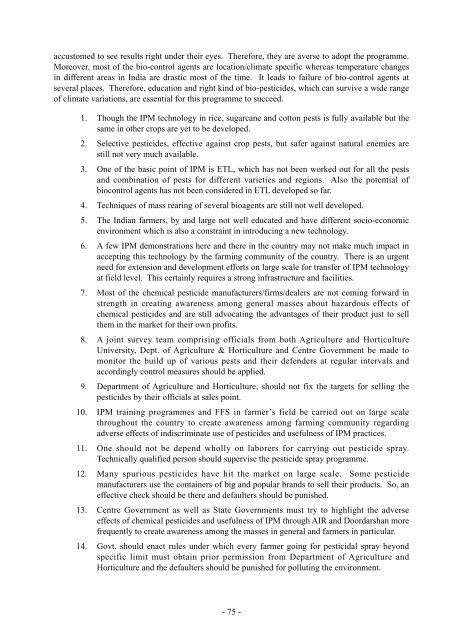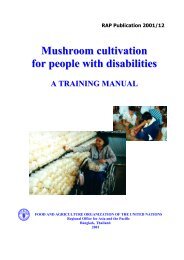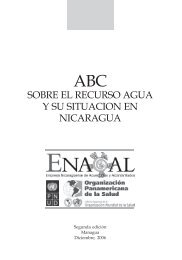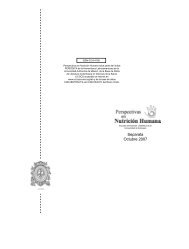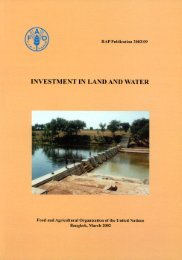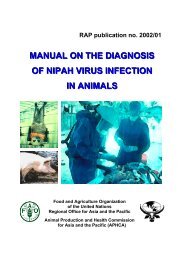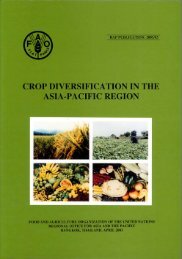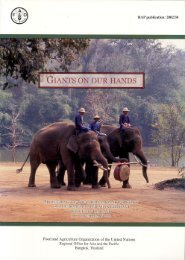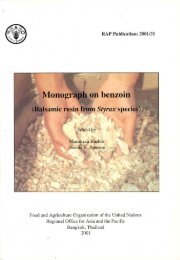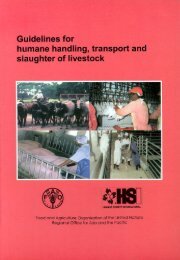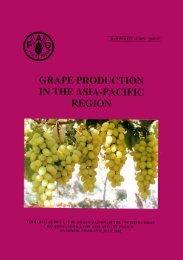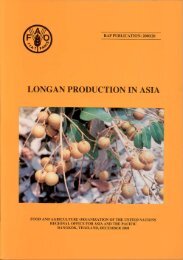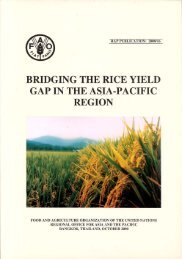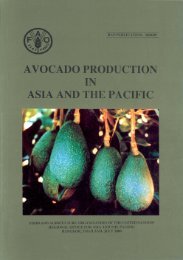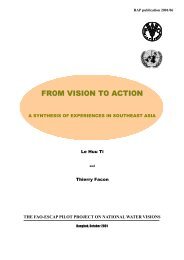Proceedings of the Asia regional workshop on the
Proceedings of the Asia regional workshop on the
Proceedings of the Asia regional workshop on the
You also want an ePaper? Increase the reach of your titles
YUMPU automatically turns print PDFs into web optimized ePapers that Google loves.
accustomed to see results right under <str<strong>on</strong>g>the</str<strong>on</strong>g>ir eyes. Therefore, <str<strong>on</strong>g>the</str<strong>on</strong>g>y are averse to adopt <str<strong>on</strong>g>the</str<strong>on</strong>g> programme.<br />
Moreover, most <str<strong>on</strong>g>of</str<strong>on</strong>g> <str<strong>on</strong>g>the</str<strong>on</strong>g> bio-c<strong>on</strong>trol agents are locati<strong>on</strong>/climate specific whereas temperature changes<br />
in different areas in India are drastic most <str<strong>on</strong>g>of</str<strong>on</strong>g> <str<strong>on</strong>g>the</str<strong>on</strong>g> time. It leads to failure <str<strong>on</strong>g>of</str<strong>on</strong>g> bio-c<strong>on</strong>trol agents at<br />
several places. Therefore, educati<strong>on</strong> and right kind <str<strong>on</strong>g>of</str<strong>on</strong>g> bio-pesticides, which can survive a wide range<br />
<str<strong>on</strong>g>of</str<strong>on</strong>g> climate variati<strong>on</strong>s, are essential for this programme to succeed.<br />
1. Though <str<strong>on</strong>g>the</str<strong>on</strong>g> IPM technology in rice, sugarcane and cott<strong>on</strong> pests is fully available but <str<strong>on</strong>g>the</str<strong>on</strong>g><br />
same in o<str<strong>on</strong>g>the</str<strong>on</strong>g>r crops are yet to be developed.<br />
2. Selective pesticides, effective against crop pests, but safer against natural enemies are<br />
still not very much available.<br />
3. One <str<strong>on</strong>g>of</str<strong>on</strong>g> <str<strong>on</strong>g>the</str<strong>on</strong>g> basic point <str<strong>on</strong>g>of</str<strong>on</strong>g> IPM is ETL, which has not been worked out for all <str<strong>on</strong>g>the</str<strong>on</strong>g> pests<br />
and combinati<strong>on</strong> <str<strong>on</strong>g>of</str<strong>on</strong>g> pests for different varieties and regi<strong>on</strong>s. Also <str<strong>on</strong>g>the</str<strong>on</strong>g> potential <str<strong>on</strong>g>of</str<strong>on</strong>g><br />
bioc<strong>on</strong>trol agents has not been c<strong>on</strong>sidered in ETL developed so far.<br />
4. Techniques <str<strong>on</strong>g>of</str<strong>on</strong>g> mass rearing <str<strong>on</strong>g>of</str<strong>on</strong>g> several bioagents are still not well developed.<br />
5. The Indian farmers, by and large not well educated and have different socio-ec<strong>on</strong>omic<br />
envir<strong>on</strong>ment which is also a c<strong>on</strong>straint in introducing a new technology.<br />
6. A few IPM dem<strong>on</strong>strati<strong>on</strong>s here and <str<strong>on</strong>g>the</str<strong>on</strong>g>re in <str<strong>on</strong>g>the</str<strong>on</strong>g> country may not make much impact in<br />
accepting this technology by <str<strong>on</strong>g>the</str<strong>on</strong>g> farming community <str<strong>on</strong>g>of</str<strong>on</strong>g> <str<strong>on</strong>g>the</str<strong>on</strong>g> country. There is an urgent<br />
need for extensi<strong>on</strong> and development efforts <strong>on</strong> large scale for transfer <str<strong>on</strong>g>of</str<strong>on</strong>g> IPM technology<br />
at field level. This certainly requires a str<strong>on</strong>g infrastructure and facilities.<br />
7. Most <str<strong>on</strong>g>of</str<strong>on</strong>g> <str<strong>on</strong>g>the</str<strong>on</strong>g> chemical pesticide manufacturers/firms/dealers are not coming forward in<br />
strength in creating awareness am<strong>on</strong>g general masses about hazardous effects <str<strong>on</strong>g>of</str<strong>on</strong>g><br />
chemical pesticides and are still advocating <str<strong>on</strong>g>the</str<strong>on</strong>g> advantages <str<strong>on</strong>g>of</str<strong>on</strong>g> <str<strong>on</strong>g>the</str<strong>on</strong>g>ir product just to sell<br />
<str<strong>on</strong>g>the</str<strong>on</strong>g>m in <str<strong>on</strong>g>the</str<strong>on</strong>g> market for <str<strong>on</strong>g>the</str<strong>on</strong>g>ir own pr<str<strong>on</strong>g>of</str<strong>on</strong>g>its.<br />
8. A joint survey team comprising <str<strong>on</strong>g>of</str<strong>on</strong>g>ficials from both Agriculture and Horticulture<br />
University, Dept. <str<strong>on</strong>g>of</str<strong>on</strong>g> Agriculture & Horticulture and Centre Government be made to<br />
m<strong>on</strong>itor <str<strong>on</strong>g>the</str<strong>on</strong>g> build up <str<strong>on</strong>g>of</str<strong>on</strong>g> various pests and <str<strong>on</strong>g>the</str<strong>on</strong>g>ir defenders at regular intervals and<br />
accordingly c<strong>on</strong>trol measures should be applied.<br />
9. Department <str<strong>on</strong>g>of</str<strong>on</strong>g> Agriculture and Horticulture, should not fix <str<strong>on</strong>g>the</str<strong>on</strong>g> targets for selling <str<strong>on</strong>g>the</str<strong>on</strong>g><br />
pesticides by <str<strong>on</strong>g>the</str<strong>on</strong>g>ir <str<strong>on</strong>g>of</str<strong>on</strong>g>ficials at sales point.<br />
10. IPM training programmes and FFS in farmer’s field be carried out <strong>on</strong> large scale<br />
throughout <str<strong>on</strong>g>the</str<strong>on</strong>g> country to create awareness am<strong>on</strong>g farming community regarding<br />
adverse effects <str<strong>on</strong>g>of</str<strong>on</strong>g> indiscriminate use <str<strong>on</strong>g>of</str<strong>on</strong>g> pesticides and usefulness <str<strong>on</strong>g>of</str<strong>on</strong>g> IPM practices.<br />
11. One should not be depend wholly <strong>on</strong> laborers for carrying out pesticide spray.<br />
Technically qualified pers<strong>on</strong> should supervise <str<strong>on</strong>g>the</str<strong>on</strong>g> pesticide spray programme.<br />
12. Many spurious pesticides have hit <str<strong>on</strong>g>the</str<strong>on</strong>g> market <strong>on</strong> large scale. Some pesticide<br />
manufacturers use <str<strong>on</strong>g>the</str<strong>on</strong>g> c<strong>on</strong>tainers <str<strong>on</strong>g>of</str<strong>on</strong>g> big and popular brands to sell <str<strong>on</strong>g>the</str<strong>on</strong>g>ir products. So, an<br />
effective check should be <str<strong>on</strong>g>the</str<strong>on</strong>g>re and defaulters should be punished.<br />
13. Centre Government as well as State Governments must try to highlight <str<strong>on</strong>g>the</str<strong>on</strong>g> adverse<br />
effects <str<strong>on</strong>g>of</str<strong>on</strong>g> chemical pesticides and usefulness <str<strong>on</strong>g>of</str<strong>on</strong>g> IPM through AIR and Doordarshan more<br />
frequently to create awareness am<strong>on</strong>g <str<strong>on</strong>g>the</str<strong>on</strong>g> masses in general and farmers in particular.<br />
14. Govt. should enact rules under which every farmer going for pesticidal spray bey<strong>on</strong>d<br />
specific limit must obtain prior permissi<strong>on</strong> from Department <str<strong>on</strong>g>of</str<strong>on</strong>g> Agriculture and<br />
Horticulture and <str<strong>on</strong>g>the</str<strong>on</strong>g> defaulters should be punished for polluting <str<strong>on</strong>g>the</str<strong>on</strong>g> envir<strong>on</strong>ment.<br />
- 75 -


